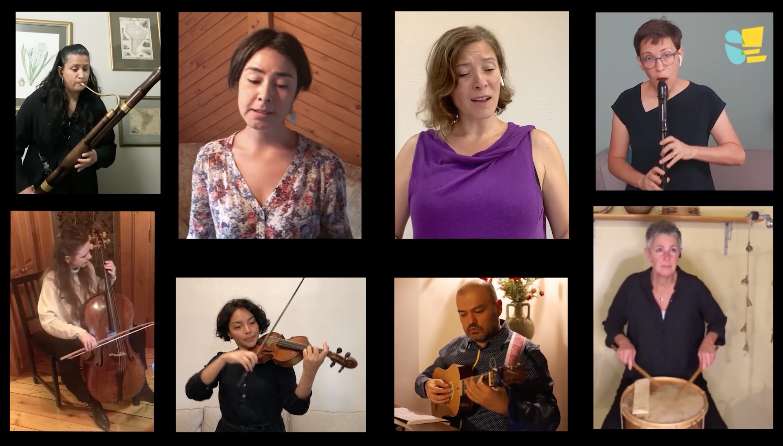by Stephanie Manning

In Episode 2.3 of Les Délices’ SalonEra, bassoonist Catalina Guevara Víquez Klein, violinist Karin Cuellar Rendon, and mezzo-soprano Raquel Winnica Young utilized one of de la Cruz’s most famous poems, Primero sueño, as a narrative arc to examine the Mexican nun’s views of the world. The result is a captivating portrait of de la Cruz told through both music and discussion.
Presented over the course of an hour, the episode was divided into four sections themed around Primero sueño: The Dream, Contemplation, Being, and Awakening. All six rarely-heard pieces set de la Cruz’s poetry to music, and the opening Madre de los Primores is the only surviving musical composition by de la Cruz herself. Anchored by Winnica Young’s warm mezzo-soprano, the piece’s soothing harmonies made for a gentle introduction into the dreamscape of Part I.
Though most of the performances were recorded remotely, the audio quality was consistent and impressive, with a beautiful blend. The only piece not presented in this way was Ausente del alma mía by Rafael Antonio Castellanos, recorded live last spring by Winnica Young and Pittsburgh-based Chatham Baroque. Witnessing performers interacting together was especially enjoyable, and the resonant acoustic brought out the mezzo-soprano’s expressive vibrato. Paired with this work was another by Castellanos: the lyrical and passionate Pues mi Dios Ha Nacido a Penar.
The discussion sections of this episode were particularly enlightening — Víquez Klein, Rendon, and Winnica Young all have a real passion for de la Cruz and her work. The three women detailed some key aspects of her life that resonate with them: the desire to learn, the drive to defend women’s rights, and the conviction of being true to oneself.
The poet’s thirst for knowledge and her distaste at the idea of getting married led her to join a convent, which would allow her to keep up her studies. “If Sor Juana was in love, she was in love with her freedom,” Víquez Klein said. This idea of self-determination inspired the programming of Antonio Durán De La Mota’s Dios y Josef apuestan. Winnica Young’s voice was well-matched with that of soprano Denise Torre Ormeño, and the movement and expressions from all performers helped bring out the song’s humorous qualities.
In the final passages of Primero sueño, the rhythm of the words becomes faster, symbolizing the battle of the day conquering the night. Fittingly, the final two pieces on the program were both full of energy. Antonio Durán De La Mota’s Fuego, fuego, que el templo se abrasa is driven by an animated four-part canon of voices, while Andrés Flores’ A este edificio célebre evokes a festive aura.
The latter piece, written well after de la Cruz’s death, is just one of many ways that her legacy continues to inspire. Features like this from SalonEra are just one more step on the path to letting the voice of this poet, composer, and protofeminist be heard around the world.
Published on ClevelandClassical.com October 26, 2021.
Click here for a printable copy of this article


